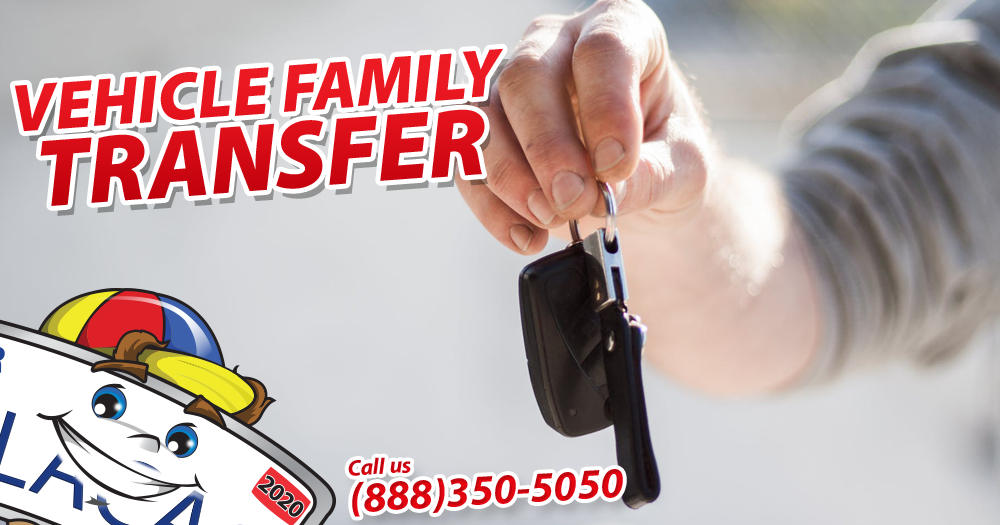What is a DMV Transfer Title to Family Member?
When the DMV does a transfer, it changes the name on the vehicle’s title. In other words, it makes another person the legal owner of the vehicle. Actually, it is when a vehicle has a new owner because they sold it. Maybe a gift or inheritance, and the new owner’s name is on the title.
For example, when you sell your car:
- You and the legal owner/lien holder if any, release interest ownership of the vehicle. That is by signing the Certificate of Title.
- The new owner completes and signs the back of the title.
- The signed title and any other documents are submitted to DMV.
- Following completion of the transfer, DMV will issue a new Certificate of Title.
Are DMV Transfer Title to Family Member Requirements Different?
Yes, substantially different. This article outlines the differences between a regular transfer and a family member transfer.
What is a family transfer?
A “family transfer” is when a:
- Spouse
- Parent
- Child
- Grandparent
- Grandchild
- Sibling
Transfers a vehicle
How Is a Family Transfer Different from a Regular Transfer?
There are three primary differences between regular transfers and family member transfers:
- On a regular transfer, use tax based on the purchase price of the vehicle is due at the time of transfer. A family member transfer is exempt from use tax with the exception of a transfer between siblings who are not minors.
- A regular transfer requires smog certification in most cases before the vehicle can be registered in the new owner’s name. A family member transfer does not require smog certification if the vehicle is currently registered and the biennial smog inspection is not due.
- A regular transfer requires the department to reestablish the vehicle value (reclassify) to determine the appropriate Vehicle License Fee due. The license fee is based on the purchase price or current market value of the vehicle is exempt from reclassification of the vehicle value
To establish eligibility for the use tax or reclassification exemption, be sure to let the department know that this is a family member transfer.
How to Transfer Title to Family Member
The DMV will require:
The California Certificate of Title properly signed or endorsed on Line 1 by the registered owner’s) shown on the title. The new owner must complete the New Registered Owner section on the back of the title and sign it.
A Statement of Facts (REG 256 Rev. 1/96 or later) for use tax and smog exemption, if applicable.
Transfer fee.
Odometer disclosure for vehicles less than 10 years old.
Additional fees, such as registration fees, may also be due.
Notice of Release of Liability
The previous owner has to submit a Notice of Release of Liability (REG 138). The seller has to submit it within 5 days.
What Fees Are Due to Transfer Title To Family Member?
The fee to transfer ownership is $15. The buyer has to pay a penalty of $10 if they don’t transfer the vehicle within 30 days.
The registration renewal fees may be due. If the registration has expired and a Planned Non-Operation status is not on file, you will be charged for past due fees and penalties.
California law requires the inspection and certification of most vehicle emission control systems every other year upon renewal of registration. This is called the biennial (every other year) smog requirement. If you are renewing your registration during a biennial period, a smog exemption for the family member transfer does not apply.
The DMV will determine when you submit the application.
Can Transfer of Title Be Made Without Payment of Registration Renewal Fees?
If the vehicle has a Planned Non-Operation status on file with the DMV and the transfer fee is deposited prior to the vehicle’s Planned Non-Operation expiration date, a transfer may be completed without payment of registration renewal fees.
Smog Certification
California law requires the inspection and certification of most vehicle emission control systems every other year upon renewal of registration. This is the biennial (every other year) smog requirement. If you are renewing your registration during a biennial period, a smog exemption for the family member transfer does not apply.
Sounds complicated, right? It won’t be with us, we can do it all for you, if you have any questions, feel free to contact us.

Pingback: Can I Write Off My Wife’s Car? – Almazrestaurant
Pingback: northwestpharmacy
Pingback: andere.strikingly.com
Pingback: canadian pharmacy
Pingback: https://kertvbs.webgarden.com/
Pingback: weruybsd.fireblogz.com39575666four-issues-to-do-immediately-about-online-pharmacies
Pingback: kernyusa.estranky.skclankyrisk-factors-linked-to-anxiety-disorders-differ-between-women-and-men-during-the-pandemic.html
Pingback: no 1 canadian pharcharmy online
Pingback: keuybc.estranky.skclanky30-facts-you-must-know--a-covid-cribsheet.html
Pingback: gwertvb.mystrikingly.com
Pingback: canada drug
Pingback: graph.orgThe-Way-To-Get-Health-Care-At-Home-During-COVID-19---Health--Fitness-04-07